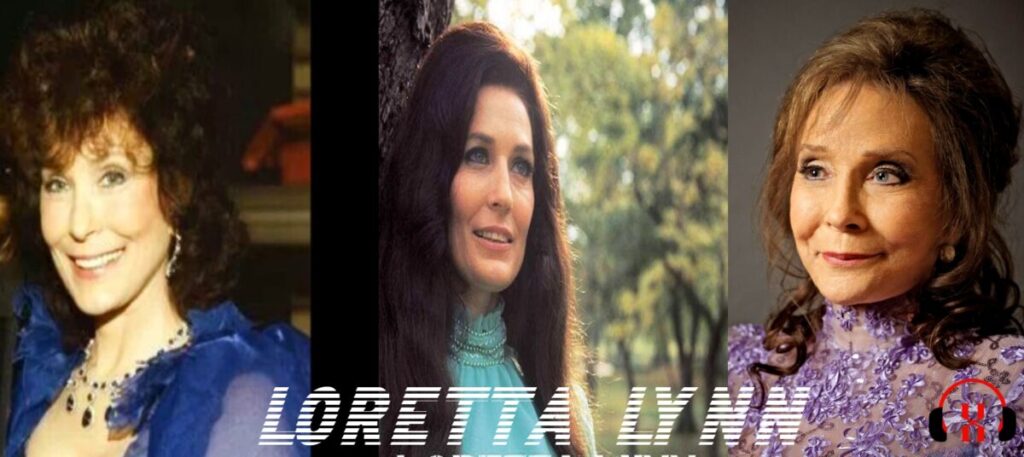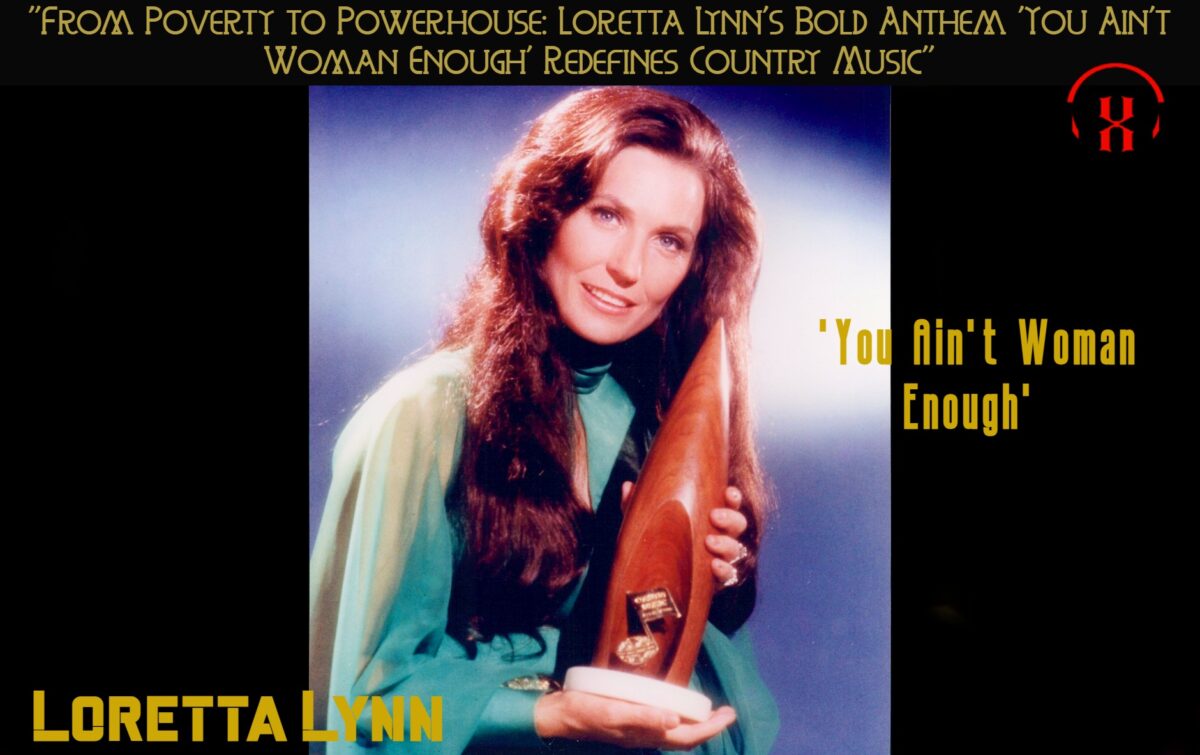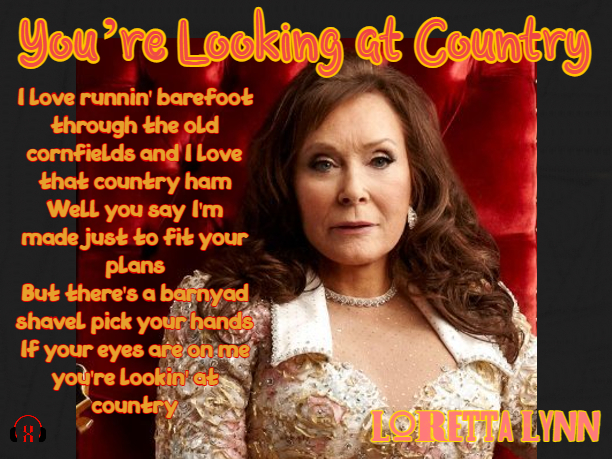![]()
The Fascinating Tale of Loretta Lynn’s Hit Song: “You Ain’t Woman Enough”
Step into the extraordinary journey of Loretta Lynn, a country music icon whose life story is etched in the annals of country music history. From her humble beginnings and early marriage to her rise as a superstar and her close bond with the legendary Patsy Cline, Lynn’s life is a true embodiment of the everyday blue-collar woman. Her extraordinary achievements include induction into the Country Music Hall of Fame in 1988 and even being honored with the prestigious Presidential Medal of Freedom in 2013.
Lynn was born in the small coal-mining community of Butcher Hollow, nestled near Paintsville in Eastern Kentucky. Her childhood was marked by abject poverty, but her life took a turn when she married at the age of 15 and moved with her husband, Mooney, to the state of Washington. Little did she know that her singing talent, discovered during a casual performance at home, would become her ticket to the music business.
Encouraged by her husband, who recognized her remarkable singing ability, Lynn embarked on her musical journey. Starting with local talent shows, fairs, and honky-tonks, she tirelessly worked her way up the ladder. Mooney played multiple roles as her manager, driver, promoter, and even babysitter during the early years. Together, they traversed towns, often at their own expense, visiting disc jockeys and distributing her first record, “Honky Tonk Girl,” which was released on the Zero label.
Surprisingly, “Honky Tonk Girl” gained considerable success, reaching the impressive #14 spot on Billboard’s country chart in 1960. Within a year, the Lynns found themselves in Music City, thanks to a fortuitous encounter with Teddy and Doyle Wilburn, a successful act on Decca Records and the Grand Ole Opry known as “The Wilburn Brothers.” Through their connections, Loretta was able to find the right people and secure a record deal with the label.
However, Loretta Lynn faced the same obstacles as other female singers of her time. The prevailing attitudes dictated that women in country music were mere ornaments, expected to conform and let men make decisions on their behalf. They were relegated to a secondary role, with little hope of achieving individual success. But Lynn refused to be bound by these constraints. She defied the norms, choosing her own material, writing her own songs, and cultivating a fan base that would rival the male powerhouses of the industry. With determination, she demanded not just to be heard but to have a genuine voice. And as people began to listen, she became an emblematic figure for women across America.
Through sheer hard work, Loretta Lynn rose to become one of the leading female singers in Nashville. By the mid-1960s, her concerts transformed into joyful reunions, with fans returning not only to savor her mesmerizing performances but also to connect with the star herself. Affectionately called the “Blue Kentucky Girl” after one of her recent hits, Lynn resonated deeply with country music’s devoted followers. Although she hadn’t yet attained the same level of stardom as some of the male luminaries, she had already achieved more chart success than the late Patsy Cline.
With increasing fame, Lynn’s assertiveness grew. Despite her limited formal education, she possessed an abundance of common sense. Recognizing her ability to empathize with the women who formed her audience and bought her records, she began to sing about issues that resonated with them—abusive relationships, infidelity, manipulation, and deception. As her confidence grew, her songs became bolder and more direct. In 1966, she unleashed “You Ain’t Woman Enough,” a powerful anthem that not only reflected her personal resolve but also marked the beginning of a new era for female country music artists and their fans.
The genesis of “You Ain’t Woman Enough” can be traced back to a real-life encounter. During one of her concerts, a friend visited Loretta backstage, sharing the painful experience of her husband’s infidelity. Shockingly, the unfaithful husband and his girlfriend were seated in the front row, the latter’s face heavily adorned with makeup. Observing them from behind the stage curtains, Lynn turned to her friend and uttered the unforgettable line, “Why, she ain’t woman enough to take your man.” Recognizing the potency of those words, Loretta retreated to her dressing room and penned the compelling song that would become a defining moment in her career.
On June 4, 1966, “You Ain’t Woman Enough” debuted on Billboard’s country singles chart. Climbing steadily, it reached its peak at #2 in mid-August, unable to surpass David Houston’s nine-week chart-topper, “Almost Persuaded.” While Houston’s song celebrated the allure of infidelity with a young paramour, Lynn’s bold anthem challenged the prevailing narrative. Although “You Ain’t Woman Enough” eventually faded from the charts after a remarkable 23-week run, its impact lingered on. Lynn’s powerful declaration had left an indelible mark, stirring conversations and opening doors for other female country music artists.
Her subsequent single, “Don’t Come Home A’Drinkin’ (With Lovin’ on Your Mind),” tackled another long-overdue women’s issue: husbands engaging in drunken amorous escapades. This provocative song not only propelled Loretta to the top spot on Billboard for the first time but also sparked controversy, leading to its ban in several cities due to its unapologetic message. However, it was only the beginning of Lynn’s crusade for women’s rights.
Over the course of her next 50 singles, Lynn fearlessly championed women’s causes. Through her songwriting, she gave voice to the thoughts and experiences that countless women had silently endured. She courageously confronted issues such as abuse, adultery, alcoholism, while advocating for birth control and assertive wives long before these topics gained mainstream attention.
Loretta Lynn became a trailblazer, offering country music’s first recognized political voice. Her songs, rooted in personal experiences, connected with millions of women who had suffered in silence for far too long. Beyond her remarkable talent as a performer, it was her honest songwriting that transformed an uneducated girl from the backwoods into one of the most respected women in the nation. With her music as their rallying cry, Lynn inspired not only her fans but women everywhere to speak out and be heard, leaving an indelible impact on the industry.
Despite the dazzling glow of her Hall of Fame career and the myth and legend that shrouded her personal struggles, it’s crucial to recognize Loretta Lynn’s true influence and the mark she made as a female pioneer. Her pivotal role became evident with “You Ain’t Woman Enough” and continued to resonate through subsequent hits such as “Fist City,” “Woman Of The World,” “I Wanna Be Free,” “Rated X,” “The Pill,” and “You’ve Come A Long Way Baby.” Without Lynn’s unadulterated honesty, it is uncertain how long it would have taken for country music, and society as a whole, to confront the power and needs of women.
Released: 1966
Artist: Loretta Lynn
Movie: Coal Miner’s Daughter
Lyrics
You’ve come to tell me something you say I ought to know
That he don’t love me anymore and I’ll have to let him go
You say you’re gonna take him, oh, but I don’t think you can
‘Cause you ain’t woman enough to take my man
Women like you they’re a dime a dozen, you can buy ’em anywhere
For you to get to him I’d have to move over
And I’m gonna stand right here
It’ll be over my dead body, so get out while you can
‘Cause you ain’t woman enough to take my man
Sometimes a man’s caught lookin’ at things that he don’t need
He took a second look at you, but he’s in love with me
Well, I don’t know where that leaves you, oh, but I know where I stand
And you ain’t woman enough to take my man
Women like you they’re a dime a dozen, you can buy ’em anywhere
For you to get to him I’d have to move over
And I’m gonna stand right here
It’ll be over my dead body, so get out while you can
‘Cause you ain’t woman enough to take my man
No, you ain’t woman enough to take my man







Comments on ““From Poverty to Powerhouse: Loretta Lynn’s Bold Anthem ‘You Ain’t Woman Enough’ Redefines Country Music””